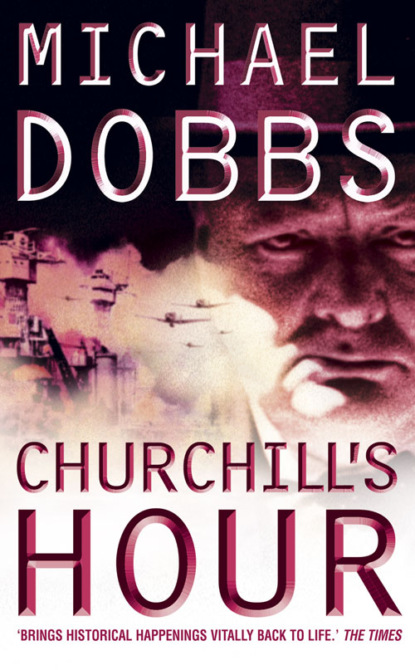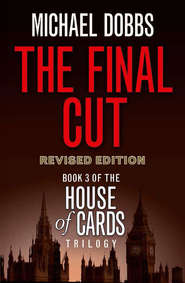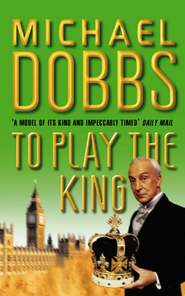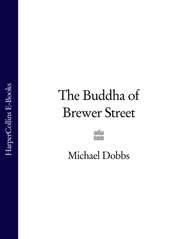По всем вопросам обращайтесь на: info@litportal.ru
(©) 2003-2024.
✖
Churchill’s Hour
Автор
Год написания книги
2019
Настройки чтения
Размер шрифта
Высота строк
Поля
‘A very understandable argument, sir. And it was certainly closer to the United States than Alaska, which I believe you purchased later.’
‘The territory of Alaska was practically empty. Full of nothing but fish and ice. I think there were maybe four hundred Russians living there.’
‘Unlike the islands of the Philippines, which you fought for. Forty years ago. You will please forgive me if that is an inconvenient or inaccurate fact. Or the islands of Hawaii. I believe the United States annexed them at about the same time.’
Damn, but he was good. Lady St John beamed. She hadn’t had this much fun since she had plied the then-German Ambassador, von Ribbentrop, with his own champagne and asked him to expound upon his feelings about Jews.
‘I will grant you, Mr Ambassador, that history has a stubborn streak,’ the American responded. ‘It doesn’t form itself into convenient straight lines. And the United States, like all nations, has a history that allows for questioning and criticism.’ The American seemed to be conceding, perhaps aware that the Japanese was preparing to chase him fully around the globe via Guam, Puerto Rico, Cuba and several other colonial contradictions. ‘But I am not concerned with history, sir. I am talking about today. And tomorrow. And the slaughter of tens of millions of innocent civilians. Whatever the cause, whatever the grievance, whatever the injustice for which redemption is sought, nothing can support such a cost.’
‘It is most unfortunate that today warfare carries with it such a terrible price.’
‘Which is why the United States has declared it will never become a combatant in this one.’
‘It is a most happy situation for your United States,’ the ambassador said with a smile of steel, ‘that, unlike every other nation represented around this table, you have not become involved in war. For my part, I pray most earnestly that your good fortune will continue, and that you will remain free from the curse of war.’
‘Hell, we don’t pick fights, Mr Ambassador. We finish ’em.’
It was, in Lady St John’s view, a most glorious cockfight, but it had gone far enough, for the moment. There were three other courses to get through; something had to be kept in reserve.
‘Would you like some more, Your Excellency? Or have you had enough?’
‘More than enough. Thank you, Lady St John.’ He bowed, which allowed him to break eye contact with the American.
‘I don’t know much about English manners, Lady St John, but if it’s not being impolite, I’d love some more,’ the American said, without waiting to be asked. He’d be damned before he followed Shigemitsu. ‘It’s what the workers on my railroad would call “damned fine chow”.’ He paused only momentarily. ‘I guess that’s the Chinese influence, eh?’
And suddenly the table was alight with a multitude of different conversations. Pamela, who had been as transfixed as Emerald at the outpouring of male hormones, was seated between the American and his ambassador. They were both tall and dark, middle-aged, with fine eyes, but there the resemblance finished. Winant was uncombed, uncertain and largely inaudible at such occasions, whereas the other man most evidently was not. And he seemed to own a railway. She placed a hand gently on his sleeve.
‘Forgive me, but I didn’t catch your name.’
‘It’s Averell Harriman.’ He smiled, a little stiffly. He gazed down at her; she knew he was struggling to keep his eyes steady. It was her dress. She’d lost almost all the weight she had gained while pregnant, but a couple of additional inches had clung to her breasts and, in this dress, they showed.
‘I’m Pamela Churchill.’
‘I know you are. I’ve already met your father-in-law. He says we must all become good friends.’
‘I hope you’re going to do everything he tells you.’
Harriman laughed. ‘That’s pretty much my job description. I’ve been put in charge of the Lend-Lease operation. The President has told me to come over here and give you everything you want.’
‘Like Santa Claus.’
‘Something like that.’
‘In which case, I can promise you, we shall become very good friends indeed.’
And suddenly there was laughter around the table, except from Shigemitsu.
Later, he was the first to leave. Lady St John led him to the door.
‘Your Excellency, it’s been such a pleasure having you with us. And particularly for me. May I let you in on a little secret? It’s wonderful to be with guests of—how shall I put this?—of a similar stature. We little people should stick together, don’t you think?’
He gave a stiff bow, and left. He did not think he would ever return.
In reasonably rapid succession, the hallways of Chequers echoed to the sound of bath waters parting, heavy male footsteps, a female scream and the crashing of a tray laden with crockery.
‘Who the hell are you?’ Churchill said, making puddles on the hallway carpet and trying to rearrange his towel with more discretion.
‘Héloise. I am Héloise,’ the young woman responded in a heavy accent, her eyes filled with horror.
‘And what the hell are you?’
‘I am the new maid.’ She was struggling to avert her eyes.
‘New maid. What new bloody maid?’
‘The new maid we agreed on, Mr Churchill.’ It was Sawyers, who had appeared as if on wings in response to the sounds of mayhem.
‘I told you we didn’t need one. Look at the mess she’s made.’
‘Well, if it’s to be a race to see who can ruin rug first, I suspect you’re in wi’ a pretty good chance yerself, zur,’ the valet replied, indicating the sodden carpet. ‘Suppose I’d better do introductions. This is Héloise. Cousin to Mrs Landemare’s husband. From Marseilles,’—his accent and lisp made a mockery of the name—‘before joining us here. And a very dangerous escape it were, too, so cook’s been telling me.’
The girl gave a nervous bob.
‘And this,’ Sawyers added, turning and raising his eyebrow as though in disbelief, ‘is the Prime Minister.’
‘Je suis Churchill,’ the Prime Minister growled in his execrable accent. ‘I don’t like new faces. And I don’t like people who go round dropping trays and making a racket. If you’re going to make a habit of it, you’d better stay out of my way downstairs.’
Héloise promptly burst into tears and fled. Churchill was left feeling very damp and a trifle silly.
‘And tell her I prefer my eggs scrambled,’ he said, stepping round the mess on the floor.
It was the twentieth of March. Pamela’s twenty-first birthday.
She spent it without any form of communication from Randolph.
She sat in the rented rectory that had meant so much to her, yet which now stared back at her like a stranger. Once it had seemed to catch every shaft of sunlight, but now it collected only draughts and dust. She thought of the many nights she had burrowed beneath the blankets, hugging a favourite bear and pretending it was Randy creeping into the bedroom rather than several degrees of frost, but those days were gone. She was twenty-one. Her first day as a legal adult. Old enough to vote. And utterly miserable.
She ate her dinner alone in the kitchen, growing a little drunk as she dismantled one of Randolph’s prize bottles of vintage champagne. It was part of a consignment he’d been given as a wedding present by one of his chums from White’s. As she drank from a glass of the finest crystal, his photograph stared at her in reproach from its ornate silver frame—another present. She was surrounded by luxury in a house where even the mice could no longer afford to eat.
She was by upbringing a straightforward country girl, not simple, but not sophisticated either, and when Randolph had introduced her to a new life she hadn’t at first entirely understood its rules. Only now was she beginning to realize that Randolph didn’t understand them, either. Idiot. He was still staring from his silver frame. Defiantly she raised her glass to him and uttered something very rude.
She spent another night shivering beneath her blankets, banging her head on bloody Macaulay, before she made up her mind. They had a mountain of wedding presents—crystal decanters, a canteen of exquisite cutlery, an antique carriage clock, fine wines, Lalique figurines, modern pearls and pieces of ancient porcelain, every kind of indulgent trinket that had been given to them by their rich friends—or, more accurately, the rich friends of Randolph’s father. She put everything up for auction. Within two weeks they were gone, every last bit and bauble, including her jewellery and his watches. A month later, so was the rectory, rented out for three times the amount they were paying for it. Arrangements were made for the baby, who was provided with a nursery and nanny at Cherkley, the country home of his wealthy godfather, Lord Beaverbrook, which in turn gave Pamela the freedom to ‘do her bit’ and take a job in the Ministry of Supply. It also enabled her to take a top-floor room at the Dorchester Hotel.
Now the Dorchester, at first sight, might have seemed an unconventional choice for a woman trying desperately to save herself from financial delinquency, but it had some surprising advantages. Many of the most powerful people in London had moved into the hotel for the duration, and Pamela knew that while she was there she would never have to pay for another meal. It also happened to be one of the safest locations in London—reinforced with steel and with a deep basement. Above all else, it was close to her father-in-law. Pamela was, after all, a Churchill, and there were benefits to be had from being related to the most powerful man in the land. One of these benefits was the substantial discount that the Dorchester offered her on their standard charges.
As she told her incredulous friends, she was so hard up she couldn’t possibly afford to live anywhere else.
There were many visitors that Easter weekend—not just family but generals, aides, the Australian Prime Minister, the Americans. It was not a season of peace.











